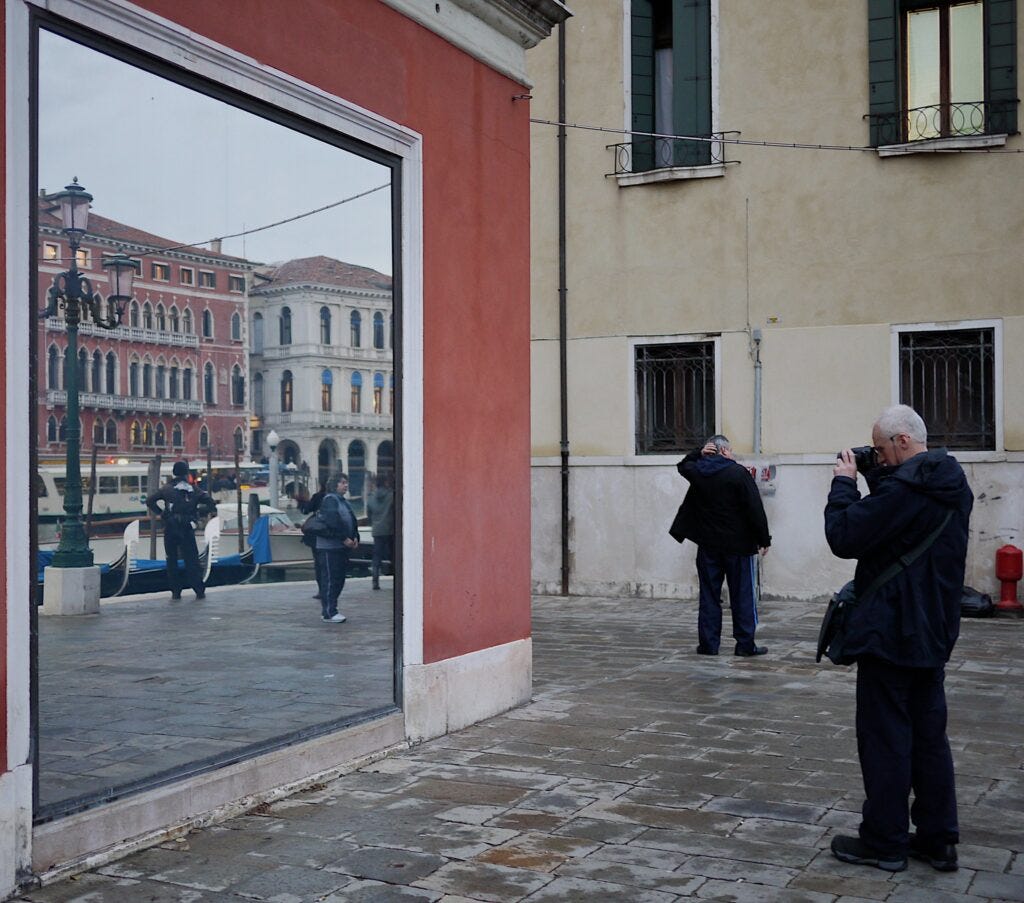Friday 16 April, 2021
As I intimated yesterday, there won’t be a newsletter on Saturdays or Sundays from next week. So if you find it missing from your inbox at weekends, it won’t be because your spam filter has dumped it. Next edition will arrive as usual on Monday morning.
John
Mirror, mirror…
Venice, November 2010
Quote of the Day
“Men are most likely to believe what they least understand.”
Montaigne
Musical alternative to the morning’s radio news
Eels | Last Stop this Town
Ignore the daft video.
Long Read of the Day
Economics in nouns and verbs by W. Brian Arthur
Brian Arthur is a really formidable thinker and writer. His book, The Nature of Technology: What it is and How it Evolves is a classic. But basically he’s a distinguished economist, which is why this new essay by him is so beautiful.
Here’s the Abstract.
Standard economic theory uses mathematics as its main means of understanding, and this brings clarity of reasoning and logical power. But there is a drawback: algebraic mathematics restricts economic modeling to what can be expressed only in quantitative nouns, and this forces theory to leave out matters to do with process, formation, adjustment, and creation—matters to do with nonequilibrium. For these we need a different means of understanding, one that allows verbs as well as nouns. Algorithmic expression is such a means. It allows verbs—processes—as well as nouns—objects and quantities. It allows fuller description in economics, and can include heterogeneity of agents, actions as well as objects, and realistic models of behavior in ill-defined situations. The world that algorithms reveal is action-based as well as object-based, organic, possibly ever-changing, and not fully knowable. But it is strangely and wonderfully alive.
Look out for the lovely comparison between how Alfred Marshall expressed his theory of industrial agglomeration and Paul Samuelson explaining international trade.
How to get at ‘the truth’
Public truths cannot be dictated-neither by a pure, all-knowing science nor unilaterally from the throne of power. Science and democracy, at their best, are modest enterprises because both are mistrustful of their own authority. Each gains by making its doubts explicit. This does not mean that the search for closure in either science or politics must be dismissed as unattainable. It does mean that we must ask and insist on good answers to questions about the procedures and practices that undergird both kinds of authority claims. For assertions of public knowledge, the following questions then seem indispensable:
Who claims to know?
In answer to whose questions?
On what authority?
With what evidence?
Subject to what oversight or opportunity for criticism?
With what openings for countervailing views to express themselves?
And with what mechanisms of closure in cases of disagreement?
If those questions can be raised and discussed, even if not resolved to everyone’s satisfaction, then factual disagreements retreat into the background and confidence builds that ours is indeed a government of reason. For those who are not satisfied, the possibility remains open that one can return some other day, with more persuasive data, and hope the wheel of knowledge will turn in synchrony with the arc of justice. In the end, what assures a polity that knowledge is justly coupled to power is not the assertion that science knows best, but the conviction that science itself has been subjected to norms of good government.
From “Back from the Brink: Truth and Trust in the Public Sphere” by Sheila Jasanoff, (Issues in Science and Technology Washington, Vol. 33, Iss. 4, (Summer 2017): 25-28.)
Another, hopefully interesting, link
How People Get Rich Now Interesting essay by Paul Graham. Link




